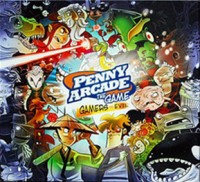
Penny Arcade: The Game, Gamers vs. Evil
The Penny Arcade Game: Gamers vs. Evil brings 13 years of fun and irreverence from the grey matter of Jerry Holkins and Mike Krahulik into a fast, fun and freaky deck building game. Please be aware this card game might not be suitable for all gamers.
Overview
Penny Arcade is the longest running most successful gaming web-comic series in history. This god-like, blinding success didn’t frighten the folks at Cryptozoic Entertainment who as fans themselves, envisioned a Penny Arcade deck building game that would cause whole sections of the population to put down their controllers, push aside their tablets and games of “Draw Something,” drop their polyhedrons and start shuffling – consequently lining the company’s pockets with gold! It is with a heavy heart that we divulge the game’s secrets to the general population – risking further blinding success.
Gameplay
Penny Arcade: The Game, Gamers vs. Evil uses lots of familiar deck-building mechanics that allows most gamers to get playing immediately. Players start with a basic starting hand determined by the character they are playing in the game – Tycho, Gabe, or 8 other characters to choose from. These characters also have some special abilities. Then, 14 card stacks of 9 cards each are laid out for purchase: 7 “Gamer” card stacks and 7 “Evil” stacks. Players play their cards, purchase new cards, discard, draw, shuffle, wash, rinse, repeat. Players are ultimately after Victory points. But that’s where the similarities end and a whole new plane of Deck-Building existence is unveiled! Ok that’s a little strong, but there are some cool things…
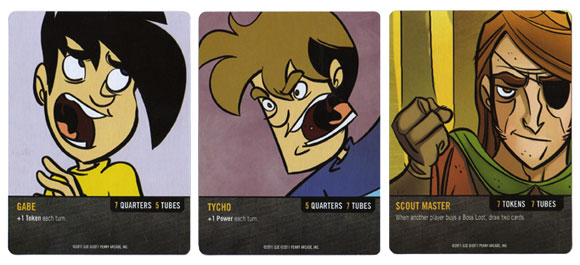
First, in most deck-builders you have one resource to spend. In Gamers vs. Evil you have two: Cardboard Tubes (the chosen weapon of the Cardboard Tube Samurai) which give you “Power,” and Quarters (Hello? Dave and Busters?) which give you “Tokens.”
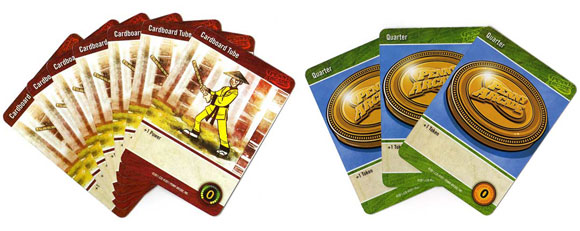
Players use these two resources to purchase the two major types of cards in the game: use Tokens to purchase Green (Gamer) cards, and Power to purchase Red (Evil) cards. Balancing your resources then becomes more challenging as you decide to spend and acquire more Power, or Tokens to realize your ultimate destiny in being a Gamer, or turning Evil thus embarrassing the other players with wanton destruction! By the way, you don’t get only one “buy” during your turn in this game. Oh no, you can divide all your Tokens and/or Power on any number of cards you want. In other words, if you reveal 6 Power in your hand, you can buy 3 cards that cost 2 Power each, or 1 card that costs 6. Follow my math there?
Some cards you can purchase allow you to attack other players with a “PvP” effect. This Player vs. Player attack might force an opponent to add a “Pax Pox” card to their deck, (a useless annoying card that takes up valuable space) or force a discard from their hand. But the ultimate reason to gather as much Power and/or Tokens as possible is to take on the Bosses for their “Loot.”
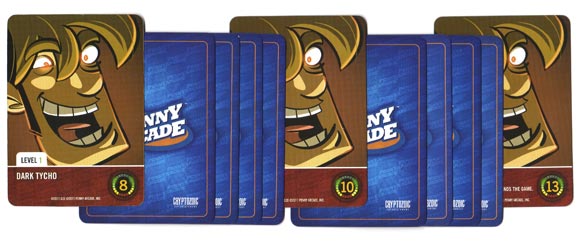
The Boss Stacks (One Gamer one Evil, of course) are set up at the beginning of the game, and are made up of a Level 1 Boss card, (say… Dark Tycho for example) 4 random face-down Loot cards, then a Level 2 Boss (Even Darker Tycho?) 4 more random face-down loot cards and on the bottom a Level 3 Boss. (Ultimate Dark Tycho!) The Loot cards are worth a lot of Victory points, and in addition have some pretty powerful affects. Evil Boss Loots for example, give a player lots of Power and attacks effects ( as Evil has a tendency to do). Gamer Boss Loots offer a fun game mechanic that when played allow the player to roll a d20 – with mostly fun positive Gamer-type effects. The cost of the Loot cards increase as the level of the Boss increases. Once either Level 3 boss is bought – game over. Players count their Victory Points and then either cry out “Kaaaaaaaahn!!” or raise their arms in primordial triumph! Booyah!
Components
The original artwork on the box cover is wicked. It shouts; “buy me!” and “play me!” The cards are of reasonable quality all the artwork is great. Overall the layout is perfect – colorful and fun. The only gripe I have is with the d20 included in the game. I mean… it just didn’t roll the right numbers. Sure, for my opponents it worked great, but for me, nothing. That’s not cool! I really think the die is defective or something. Argh!
Learning Curve
It’s not really a curve, more of a learning… line? Anyone can learn this game… and easily. You know? That’s it, really…anyone. It’s a line.
Who would enjoy this?
Final Thoughts
Any game built around a successful license has a lot to live up to. It has to meet the expectations of the folks who know the license inside and out, who are seeking out the game to enjoy its characters and share in its coolness. In most cases, games that have major licensed themes are targeted to fans of that brand. (i.e. – I Like Penny Arcade so I will like this game.) So one would think that if a person wasn’t familiar the characters and world of Penny Arcade, there would be a huge disconnect with the property and the game experience would suffer.
Not so. In fact, the variance on familiar DBG mechanics made the game extremely enjoyable and coupled with the sheer absurdity of the characters in the game, this created the urge to find out more about this geek leviathan that is Penny Arcade. That’s a testament to designer Paul Sottosanti in creating a successful blend of accessible game play for non Penny Arcade fans, with famous characters and situations for the actual fans of the property. There is not one sentence of “flavor text” on any of the cards. Where in some licensed games the characters would call for a bit of explanation to make it appealing to those who aren’t familiar with the brand or fun quotes for the fans, Crypto left it out, creating even more interest in the brand.
Yes, there are some less than appropriate aspects of the game, but Penny Arcade is not for youth or the easily offended. Never has been. The game is a blast. And with the recently released expansion: Penny Arcade: The Game, Rumble in R’lyeh – it’s sure to have some longevity in our less-than-conventional hobby.
User Reviews (2)
Add a Review for "Penny Arcade: The Game, Gamers vs. Evil"
You must be logged in to add a review.

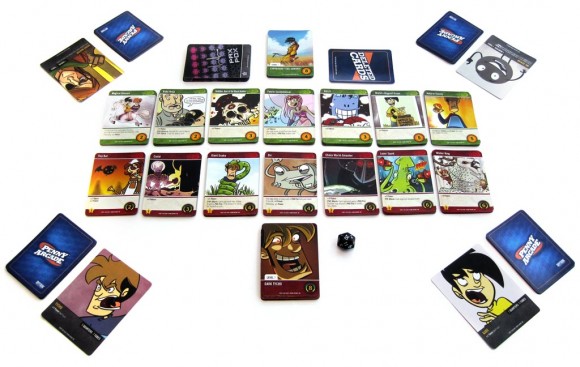



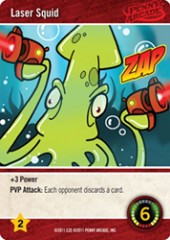

All in all it is another deck building game. There are some unique aspects of the game but nothing that no other deck building game has tried. There are two different resources, each character has a special ability, some cards attack other players, etc.
Strategies are much like any other deckbuilder. Buy better cards, get cards to get rid of worse cards, eventually you can start buying boss loot then the game ends.
The one thing that sets it apart from other deckbuilders is the humor. It has references to funny comics on cards with funny names that often have funny pictures. You can all laugh together as everyone yells “Touch Wieners!” together and reveals the card. Dominion can be very, very dry with cards like “Market” and “Moat.” This offers some of the complexity of a Deckbuilder while ensuring everyone is having a fun time.
This is a deck building game in the style of “Market based” there are piles of pre-choosen cards 6 out of 12 and you can purchase as many as you can afford per turn. Which you then instantly discard to build up your deck.
This game is very silly and is played best when you have a group of people that can really enjoy the absurd aspect of playing a game where you can touch wieners :D.
The mechanics are all pretty simple but can definitely play into some rather complex turns as the game progresses.
I feel like the green cards generally feel slightly under powered as you really require red cards to win the game in the end.
Overall though I really love penny arcade and as a first deckbuilding game this is very accessible to people less familiar with some of the more complicated mechanics of card games.